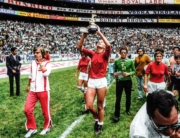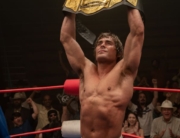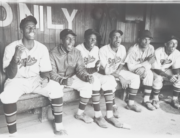It’s not often you see a compelling movie about the making of a shoe. But few shoe lines are as beloved as Air Jordan, and fewer athletes more iconic than Michael Jordan, whose legacy on the basketball court speaks for itself. Air, a new sports drama directed by Ben Affleck, is about one of those two legacies: how Nike scored the brand deal with Jordan and drastically altered the corporate landscape of player/apparel cross-promotion as we know it. But it’s an odd drama in execution, slam dunking so many categories while moving a key piece of the puzzle out of sight: Jordan himself.
That’s not to accuse of Air of being poorly made or insensitive. It’s arguably Affleck’s best directorial effort since Argo and another fantastic collaboration between him and Matt Damon amid a strong ensemble. If you like Moneyball or Damon’s own Ford v. Ferrari, you’ll enjoy Air for its blend of male friendship and sports history.
Set in 1984, Air visits Nike at a pivotal moment. Though a hit with runners, the company lags behind competitors Adidas and Converse in basketball, particularly at getting recognizable NBA stars to wear their shoes on the court. Key to upgrading the brand is Sonny Vaccaro (Damon), a talent scout who helps CEO Phil Knight (Affleck) determine which new players are the next big thing and thus valuable to Nike’s stock prices. Unfortunately, this insight has paid little dividends, something Vaccaro’s colleagues Howard White (Chris Tucker) and Rob Strasser (Jason Bateman) repeatedly needle him for, along with his gambling record.
So, Vaccaro makes a massive bet. He takes the $250,000 Nike intended to distribute among three players and devotes it to courting just one: then-Chicago Bulls newcomer Jordan. It’s an uphill battle given the athlete’s disinterest in anything Nike–related, as Knight, White, and especially Jordan’s agent, David Falk (Chris Messina), remind Vaccaro. Yet Vaccaro has a gut feeling about Jordan’s potential, to the point of driving out to North Carolina and directly making his case to Jordan’s dad, James (Julius Tennon), and mom, Deloris (Viola Davis, Jordan’s personal casting choice), on what they all know to be true: Jordan is special.
The movie fully embraces its 1980s identity, both playfully and excessively. Actors dress up in dolphin shorts and have wild, frizzy hairdos and type on retro computers. For an extra nostalgic punch, the movie opens with a montage of the era’s cultural events. The soundtrack consists of ’80s needle drops, and its story clearly revolves around that decade’s be-the-best ethos. All of which amplifies Nike’s unique underdog position, a company driven by an entrepreneurship-style of principles, ordinary looking employees, and the occasional Buddhist quote from Knight. Damon’s schlubby, ragtag charm stands out in this world of high-profile suits and smarmy agents, keeping his business venture engaging even as the movie follows the traditional highs and lows of a sports drama conundrum.
Indeed, the cast balances out the routine camerawork with an emotional hook that guarantees a strong rewatch appeal. Aside from Matthew Maher, whose Peter Moore role—however entertaining—comes off like a shoemaker version of Bond’s Q, every performance feels just authentic enough to give this world and company some deeply human stakes. This includes a cameo by Marlon Wayans as basketball coach George Raveling, and it especially holds true with Davis. Despite her infrequent screen time, Davis makes Delores feel powerful as a matriarch who knows what Jordan needs and understands what these corporations must do for him beyond providing a glorified dribbling platform. As both parties acknowledge about the Air Jordan’s potential, it’s just a shoe until Michael Jordan steps into it. Then it becomes something more.
That’s what makes Jordan’s semi-absence awkward, depending how you read it. Young Jordan is in Air, but only as an extra, shown from behind or a low angle while other characters talk to or around him. It’s hard to imagine anyone living up to that performance, so the film doesn’t try. Yet it feels like Air sacrifices a part of its lore by ignoring Jordan’s contribution as other people compete for his hand in business. All of which raises the question: Did Jordan, even with all his obvious, unparalleled college achievements, know just how successful he would become?
Perhaps so. What really brings Air together is a different sort of montage in act two, where, rather than continue Nike’s tailor-made pitch to Jordan’s family, Vaccaro speaks from the heart. He lists the tribulations Jordan will face after hitting the big leagues: the skeptical journalists; the scandals; the personal heartbreaks; and how he will emerge from it all stronger, as a larger-than-life symbol. You could say the same of Air: a film that takes something we’ve all seen before and makes it feel distinct from the rest. Now that’s good marketing.

















Leave A Comment